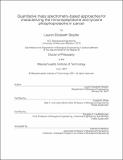Quantitative mass spectrometry-based approaches for characterizing the immunopeptidome and tyrosine phosphoproteome in cancer
Author(s)
Stopfer, Lauren Elizabeth
DownloadThesis PDF (35.74Mb)
Advisor
White, Forest M.
Terms of use
Metadata
Show full item recordAbstract
Significant advancements in proteome-based analyses stem from innovations in the field of mass spectrometry (MS), an analytical method which allows for the sequencing, identification, and quantification of peptides and proteins in complex biological mixtures. MS enables a molecular and systems-wide understanding of the cell state, capturing post-translational modifications, protein turnover rates, protein-protein interactions, and other measurements that genetics cannot assess. Still, MS-based methods often require a compromise between reproducibility, quantitative accuracy, sensitivity, and depth of coverage, limiting their utility in research and translational settings alike. Here, I present a collection of MS-based platforms for targeted tyrosine phosphorylation signaling measurements and quantitative immunopeptidomics profiling, enabling novel biological findings in the field of cancer research. I describe how targeted tyrosine signaling assays can be leveraged to identify activated signaling pathways and assess immune infiltration in colorectal cancer. I also demonstrate how small molecules alter the peptide major histocompatibility complex repertoire in melanoma, and report copies-per-cell estimates of select treatment-modulated antigens using targeted MS, informing the development of targeted immunotherapies. Together, these findings highlight how innovations in MS-based methods can be used to advance a basic biology understanding of cancer and serve to demonstrate the clinical utility of using such assays to inform cancer therapy.
Date issued
2021-06Department
Massachusetts Institute of Technology. Department of Biological EngineeringPublisher
Massachusetts Institute of Technology